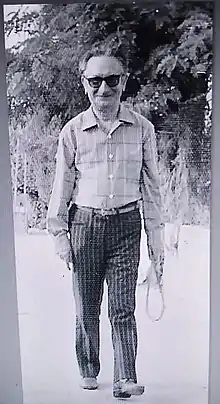
Binem Heller (1908–1998) was a Polish poet and activist.[1]
Life
Heller was born in 1908 in Warsaw, and became a glove worker at the age of fourteen.[1]
Writing in Yiddish, he emerged early as a leader of Poland's proletarian poets, equivalent to the Proletpen.[2] His first collection, "Through the Bars", was published in Łódź in 1930 and was confiscated by the Polish authorities.[3]
From 1937 to 1939, he lived in Belgium and Paris. He returned to Warsaw, then fled to Bialystok before the Nazi armies. After the invasion of the Soviet Union in 1943, he took shelter in Alma-Ata, where he wrote the poems "Inheritance" and "In Shadow".[4] In 1947, he returned to Poland, hoping to participate in a revival of its Jewish cultural life.[5] Heller helped write the script for the 1946 film Unzere kinder, one of the first films to address the Holocaust.[6] In Poland, Heller was a member of the Union of Jewish Religious Communities in Poland and the Jewish Writers' Union.[7] "Spring in Poland" appeared in 1950, and "Poems, 1932-1939", in 1956.
He then moved to Paris and Brussels, where his poem of political renunciation, "Alas, how they shattered my life", caused a storm of controversy.[8] A year later, he made Israel his home. His many later works include New poems (1964) and They shall arise (1984).
Binem Heller died in Israel in 1998.
Works
- Durkh krates (Through bars, poems), Warsaw, 1930
- In umru fun teg (In apprehension of days, poems), Warsaw, 1932
- Afn vint, poeme (Into the wind, a poem), Warsaw, 1936
- Lider (poems), Minsk, 1940
- Di erd hot getsitert, lider (The earth shook, poetry), Moscow, 1947
- Der veg af varshe (The way to Warsaw), Moscow, 1948[9]
- Durkh shotn un shayn (Through shadows and light), Warsaw ,1948[10]
- Friling in poyln, lider (Springtime in Poland, poems), Warsaw, 1950
- Heymerd, lider (Motherland, poems), Warsaw, 1951
- In unzer tsayt, lider (In our time, poems), Warsaw 1954
- Dos ershte lid (The first poem), Warsaw, 1956
- Klorkeyt (Clarity), Warsaw, 1957
- Naye lider (New poems), Tel Aviv, 1964
- Dor un doyer (Generation and duration), Tel Aviv, 1967
- A boym in ovnt (A tree in the evening), Tel Aviv, 1971[11]
- In varshever geto in khoydesh nisn (In the Warsaw Ghetto in the month of Nissan), Tel Aviv, 1973
- Bikhides (In private), Tel Aviv, 1975
- Dos tsugezogte vort (The promised word), Tel Aviv, 1980[12]
- Zey veln oyfshteyn, lider (They will rise up, poems), Tel Aviv, 1984[13]
- Togbukh af tsurik (A retrospective diary), unpublished memoir manuscript[14]
References
- 1 2 "Binem Heller (1908-1998) | The National Library of Israel". www.nli.org.il. Retrieved 2023-03-07.
- ↑ NALEWAJKO-KULIKOV, JOANNA (2015-12-10), "Yiddish Form, Communist Content:", Polin: Studies in Polish Jewry Volume 28, The Littman Library of Jewish Civilization, pp. 351–370, retrieved 2023-04-07
- ↑ Rejzen, Zalman (2016-03-24). "Yiddish Leksikon: BINEM HELER (HELLER)". Yiddish Leksikon. Retrieved 2023-04-07.
- ↑ ""Inheritance" and "In Shadow" | Yiddish Book Center". www.yiddishbookcenter.org. Retrieved 2023-04-07.
- ↑ ""Inheritance" and "In Shadow"".
- ↑ Schwarz, Jan (2013-11-14), "The Holocaust and postwar Yiddish literature", Literature of the Holocaust, Cambridge University Press, pp. 102–117, retrieved 2023-04-07
- ↑ Rejzen, Zalman (2016-03-24). "Yiddish Leksikon: BINEM HELER (HELLER)". Yiddish Leksikon. Retrieved 2023-04-07.
- ↑ Kramer, Aaron (1989). A Century of Yiddish Poetry. Cornwall Books. p. 333. ISBN 9780845348154.
- ↑ Heller, Binem (1955). Der ṿeg oyf Ṿarshe poeme. National Yiddish Book Center. Ṿarshe : Yidish Bukh.
- ↑ Heller, Binem (1948). Durkh shoṭn un shayn. National Yiddish Book Center. Lodzsh : Yidish-bukh.
- ↑ Heller, Binem (1971). A boym in oṿnṭ. National Yiddish Book Center. Tel Aviv : Y.L. Perets.
- ↑ Heller, Binem (1980). Dos tsugezogṭe ṿort. National Yiddish Book Center. Tel-Aviv : Farlag Y.L. Perets.
- ↑ Heller, Binem (1984). Zey ṿeln oyfshṭeyn. National Yiddish Book Center. Tel-Aviv : Farlag Y.L. Perets.
- ↑ "The USSR Turned Against The Jews. But First, It Was A Yiddish Intellectual Haven". The Forward. 2019-02-14. Retrieved 2023-04-07.
Further reading
- Heller, Binem (1948). Durkh shotn un shayn. Lodz: Yidish bukh: lodzsh. ISBN 0657073717.